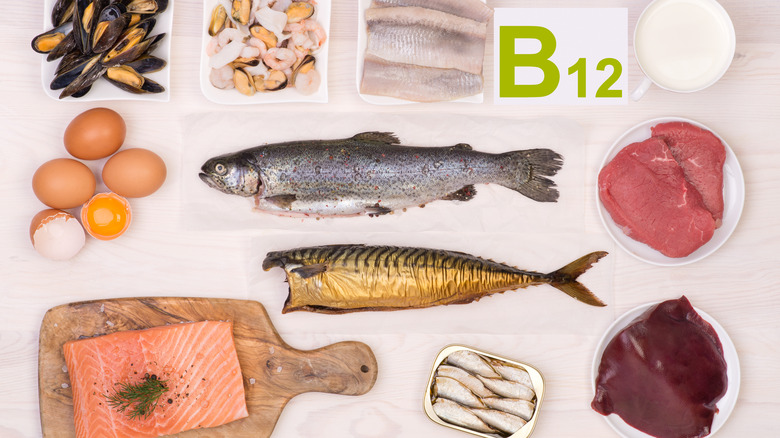Men And Women Over 50 Should Eat These Proteins For Healthy Aging
Healthy aging, for both men and women, is important if you are to maintain your quality of life into your golden years and still be able to do the things that you love. A fast-paced calendar that ticks away your years doesn't always have to mean sickness, mental and cognitive decline, and other things that are typically associated with aging.
Making sure you're getting a nutritious diet with all of your essential macronutrients — proteins, carbohydrates, and fats — is a big piece of the puzzle when it comes to this goal. So is exercising, spending quality time doing the things you love, and putting your brain to good use to keep it sharp and healthy.
Going back to food, though, a few different sources of protein in particular, become all the more important as the years add on. We're referring to animal protein sources like liver and kidneys, beef, clams, sardines, tuna, trout, salmon, eggs, and cow's milk and other dairy foods like yogurt and cheese. And it's not just because you need enough protein for your age. It's because these protein sources contain an essential vitamin that isn't produced by your body: vitamin B12. Vitamin B12 is especially important for aging adults (starting in their 50s and 60s) for a few different reasons.
Why do aging men and women need more vitamin B12?
Wrinkles and graying hair are not the only changes that occur with age. Your capacity to absorb important vitamins and minerals from food also diminishes, per Howard D. Sesso, director of nutrition research and an associate epidemiologist at the division of preventive medicine at Brigham and Women's Hospital (via AARP). "Vitamin B12 is one of the essential vitamins, and our ability to absorb it weakens quite a bit as we enter our 60s and 70s."
Vitamin B12 is required for a lot of things. From the efficient functioning of your brain and nervous system, and energy production to red blood cell formation, anemia prevention, DNA synthesis, and reducing the risk of macular degeneration, this vitamin plays a crucial role in all of these processes. If you're not getting enough vitamin B12, you might feel tired and weak. You might also experience nausea, diarrhea, vomiting, weight loss, loss of appetite, numbness and tingling in your hands and feet, vision-related issues, memory problems, confusion, depression, and irritability.
Your body has a mechanism via which it absorbs vitamin B12 from food, and your stomach acid is involved in this process. It helps extract B12 from food, which then binds to a protein in your stomach before being absorbed by your body. "We tend to produce less stomach acid as we get older. That makes it harder to extract B12 from food," explained Dr. Meir Stampfer, professor of epidemiology and nutrition at the Harvard T.H. Chan School of Public Health (via Harvard Health Publishing).
Where can you get vitamin B12 if animal protein isn't your thing?
Older men and women who are vegan or vegetarian have other sources of vitamin B12, some of which also happen to be rich sources of protein. Fortified nutritional yeast, fortified cereal, fortified nondairy milk, vegan spreads, and meat substitutes are some examples.
Another option includes vitamin B12 supplements. In fact, it is not uncommon for older adults to be prescribed B12 supplements. Others who take B12 supplements include pregnant or nursing mothers, vegetarians and vegans, people with gastritis or digestive diseases (e.g., Crohn's disease, celiac disease), and people who've had gastrointestinal surgery. All of these things can mess with how much vitamin B12 you're really absorbing from food.
The good thing about vitamin B12 supplements is that you don't need the help of stomach acids for absorption, per Dr. Meir Stampfer (via Harvard Health Publishing), making them ideal for men and women over 50. However, which kind of supplement you go for might matter, too. There are two kinds: one that is naturally derived (methylcobalamin) and the synthetic version (cyanocobalamin). If you have kidney problems, you may want to steer clear of the synthetic version. Cyanide buildup because of cyanocobalamin is a concern for those with kidney issues. Apart from vitamin B12, there are other vitamins you should be taking in your 60s. You may want to check out what those are too.


